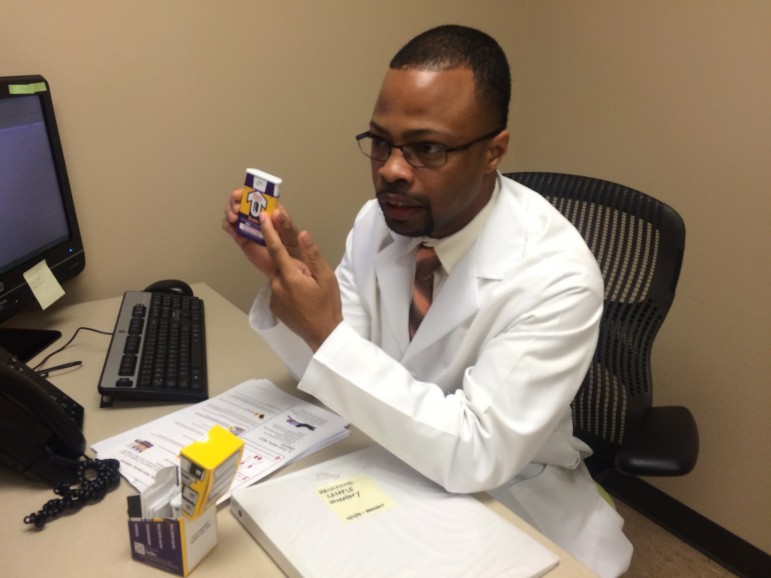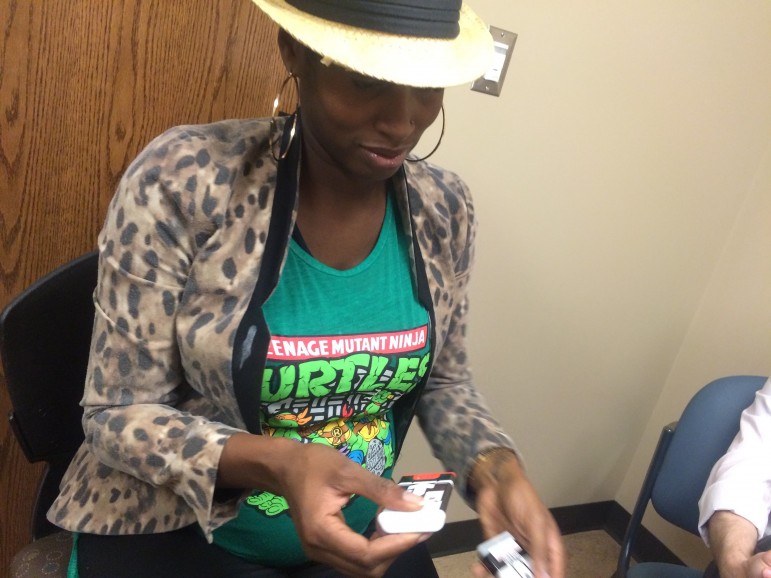Naloxone Helps Stop Heroin Overdoses in Alabama, But Still Not Widely Used
In Jefferson County, heroin abuse rose dramatically in 2014. The county coroner attributed more than 140 deaths to heroin. Law enforcement and the state have been rushing to respond. Last year, the state legislature approved access to a heroin antidote: naloxone, more commonly known as narcan. If used properly, naloxone can reverse the effects of a heroin overdose. Public health officials in Alabama are trying raise awareness and get the potentially life-saving drug to the people who need it most.
More Drugs, More Overdoses
Rev. Matt Lacey is Senior Pastor at Church of the Reconciler, a United Methodist Church on the west side of downtown Birmingham that provides outreach to the homeless.
“Essentially our mission is to walk with folks who are on the street. Be with them on that really long journey from being on the street and into housing,” says Lacey. “We do everything from food to medical care, to everything in between.” That includes drug counseling. Lacey says he’s seen a rise in heroin abuse among the homeless population they serve.
“Heroin has become much so cheaper than prescription drugs. It seems to be the drug of choice for a lot of people on the streets rather than pills,” says Lacey.
“We deal with a lot of drug use and drug abuse,” says Kay Simmons, who also works with Lacey at Church of the Reconciler. She’s says their ministry has had to adapt. “We have had instances where people have overdosed. We had no other option but to call 911,” she says.
But Lacey and Simmons wanted to be better prepared, so on a recent Monday they visited the Jefferson County Department of Health to train on how to use naloxone to reverse a heroin overdose. In 2015, the Alabama Legislature approved a law allowing doctors and dentists to prescribe naloxone to people struggling with heroin abuse or to a friend or family member of a user.
Training To Use Naloxone
Dr. David Hicks, Medical Director for Adult Health and Family Planning, leads the training at the Jefferson County Department of Health. Rev. Lacey and Simmons sit in his small office as he spreads out pamphlets and naloxone injectors on his desk. The Jefferson County Department of Health has run this weekly clinic since November. Hicks says they’ve trained several dozen religious leaders, university staff and people close to heroin addicts to use naloxone. Participants leave with a prescription for naloxone and an injector. He asks Lacey and Simmons a few questions.
“Why do you feel that this is needed?” asks Dr. Hicks, filling out a form on his computer.
“We see a lot in the homeless community,” responds Lacey. “In fact, a couple weeks ago we had an overdose in our restrooms. So we want to have this on hand in case that ever happens again.”
Dr. Hicks opens a box containing one naloxone injector and one empty injector. He hands this “trainer” to Lacey. It looks like an EpiPen, the device people use to stop allergic reactions.
“This is going to teach you to give the injection,” says Dr. Hicks. “There’s no needle in here. You’re going to do it to yourself right now,” he says. Lacey and Simmons both laugh nervously.
Lacey goes first. The trainer’s robotic voice guides him through the process. He stabs the naloxone trainer into his thigh and holds for five seconds as the trainer counts, “1, 2, 3…”
Kay Simmons goes next. She says it’s surprisingly easy. “I would feel comfortable just doing it,” says Simmons. “It’s not messy and I’m not actually having to inject the needle in.” Simmons also says it’s empowering.
“The feeling that we have sometimes when we can’t help people in these types of situations can be overwhelming. So it’s exciting for me to have this product,” says Simmons. “Yeah,” responds Lacey. “I mean, hopefully we won’t have to use it.”
Lacey and Simmons say they’ll go back to Church of the Reconciler and train the rest of the staff on how to use the naloxone injectors. But Hicks and other Jefferson County health officials say not a lot of people are using naloxone or even know that you can get a prescription for naloxone in Alabama. They’re starting an aggressive media campaign next month. The goal is to get the drug to as many people who need it as possible.
Why haven’t Kansas and Alabama — among other holdouts — expanded access to Medicaid?
Only 10 states have not joined the federal program that expands Medicaid to people who are still in the "coverage gap" for health care
Once praised, settlement to help sickened BP oil spill workers leaves most with nearly nothing
Thousands of ordinary people who helped clean up after the 2010 BP oil spill in the Gulf of Mexico say they got sick. A court settlement was supposed to help compensate them, but it hasn’t turned out as expected.
Q&A: How harm reduction can help mitigate the opioid crisis
Maia Szalavitz discusses harm reduction's effectiveness against drug addiction, how punitive policies can hurt people who need pain medication and more.
The Gulf States Newsroom is hiring a Community Engagement Producer
The Gulf States Newsroom is seeking a curious, creative and collaborative professional to work with our regional team to build up engaged journalism efforts.
Gambling bills face uncertain future in the Alabama legislature
This year looked to be different for lottery and gambling legislation, which has fallen short for years in the Alabama legislature. But this week, with only a handful of meeting days left, competing House and Senate proposals were sent to a conference committee to work out differences.
Alabama’s racial, ethnic health disparities are ‘more severe’ than other states, report says
Data from the Commonwealth Fund show that the quality of care people receive and their health outcomes worsened because of the COVID-19 pandemic.









